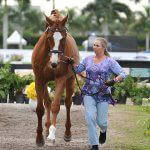The first time I saw Melanie Mitchell, she was mounting her 18-hand mare who was rearing and squealing. I’d never seen a horse that big being that naughty. Darn. Searching for a new trainer, I’d heard good things about Melanie. I turned to leave, sure that she’d cancel her class. Instead, she settled into the saddle and the mare instantly calmed. I knew, as I watched her transform that “crazy” mare into an incredibly elegant show horse, Melanie would be my next coach. I didn’t know then that she’d also become my cheerleader, my taskmaster, my caretaker, and, eventually, my close friend.
People say you need a once-in-a-lifetime horse. Sure, but you must have that one special trainer. You know, the one who reads your fears, your abilities, your future. The one who will buck you up while tearing you apart, right before building you into something better. The one who is already thinking of your next step, even as you brush dirt from your breeches. Time and again, that coach is just as important as the horse you ride. No, more important. With the right trainer, you’re suddenly looking at the horizon, wondering how far you can go.
 Each time I think I’ve seen my edges, Melanie has a wider view, a further reach. Each point where I’ve felt completely defeated, she is ready with the next step. When my disability was downgraded right before my very first CPEDI due to additional physical issues, she was in my ear regaling me with why it was a good thing. When I kept going off course, she’d already researched how to add a Commander to call out the dressage test movements.
Each time I think I’ve seen my edges, Melanie has a wider view, a further reach. Each point where I’ve felt completely defeated, she is ready with the next step. When my disability was downgraded right before my very first CPEDI due to additional physical issues, she was in my ear regaling me with why it was a good thing. When I kept going off course, she’d already researched how to add a Commander to call out the dressage test movements.
There’s really no such thing as a para trainer, per se. Able-bodied trainers make the hard decision to go above and beyond, to think outside the box, to create a game plan for someone with physical disabilities to compete in a sport they both love. To become a para coach, they must consider the athlete’s disabilities and how those affect his/her riding, but also how it all affects the horse. The coach must train the horse to accept and understand the rider’s cues while keeping the horse light and balanced. In high-performance situations, the trainer must also maintain an upper level frame, with jump in the canter and lift in the trot.
While training the able-bodied has its own challenges, para athletes need a trainer for physical and psychological support, as well as someone who teaches riding. Consider, for a moment, how you would go about washing your horse with one hand or leading your horse while in a wheelchair. Now, think about how you would turn your horse in a 10-meter circle without using your legs or keep your horse balanced through an extended trot with one arm 6” shorter. Imagine how your horse might react if your left leg whispered “canter” but your right shouted it.
Melanie has risen to every challenge, always one step ahead, readying both my horse and me for the future, literally movement by movement, sometimes thought by thought. She has supported me in ways, big and small, making this journey not only a possibility but a fun adventure, even when it doesn’t go as planned. We call ourselves the “Drop Back and Punt Girls”. Life hasn’t exactly been following our play-book lately but there’s always something around the next turn, even if it wasn’t on our original map. Melanie keeps us headed forward while keeping the health and comfort of her horse and human athletes in mind.
Both Aquarians, Melanie and I are quite alike. It’s amazing how often we argue a point, only to find we are saying the exact same thing – in different ways. If I could never ride again, our friendship would remain deep. I cannot imagine my future without this amazing friend, amazing trainer, amazing coach. Everyone should be this lucky.
Search
Recent Articles
- How to take a horse from SHOES to BAREFOOT with Alex Ridgeway & Dr Mark Caldwell
- 8 Laminitis Myths Busted!
- I’ve learnt as I’ve got older to really listen to what the people around me say about others
- The dangers of sleep deprivation in horses
- The third part of our series on stretching and flexibility with Sharon Stuart or Stuart Equine – forelimb and neck stretches for the horse and shoulder stretches for the rider
Categories
- Advice Hub
- Athlete
- Carriage Driving
- Dentistry
- Dressage
- Endurance
- Eventing
- Farrier
- Featured
- Featured Horse Ads
- Featured Posts
- Horse Racing
- Horse's Mouth
- Horseball
- Hunting
- Le Trec
- Leisure Riders
- Mounted Games
- Nutrition
- Polo
- Polocrosse
- Reining
- Rescue & Rehabilitation
- Show Jumping
- Showing
- Tack Room
- Team Chasing
- The Pony Club
- Therapy
- Training
- Vaulting
- Veterinary




